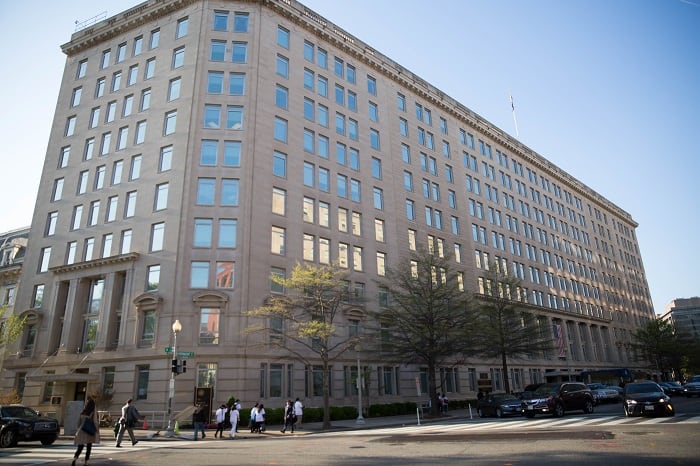BEIJING — Chinese Foreign Minister Qin Gang warned Tuesday that Beijing and Washington are headed for “conflict and confrontation” if the U.S. doesn’t change course, striking a combative tone at a moment when relations between the rivals are at a historic low.
In his first news conference since taking office late last year, Qin’s harsh language appeared to defy predictions that China might abandon its aggressive “wolf warrior” diplomacy in favor of more moderate rhetoric as the two countries face off over trade and technology, Taiwan, human rights and Russia’s invasion of Ukraine.
Washington’s China policy has “entirely deviated from the rational and sound track,” Qin told journalists on the sidelines of the annual meeting of China’s rubber-stamp legislature, when leaders lay out their economic and political priorities for the coming year.
“If the United States does not hit the brake, but continues to speed down the wrong path, no amount of guardrails can prevent derailing and there surely will be conflict and confrontation,” said Qin, whose new position is junior to the Communist Party’s senior foreign policy official, Wang Yi. “Such competition is a reckless gamble, with the stakes being the fundamental interests of the two peoples and even the future of humanity.”
Qin’s comments echoed remarks made by leader Xi Jinping in a speech Monday to legislators.
“Western countries led by the United States have implemented all-round containment, encirclement and suppression of China, which has brought unprecedented grave challenges to our nation’s development,” Xi was quoted as saying by the official Xinhua News Agency.
In the face of that, China must “remain calm, maintain concentration, strive for progress while maintaining stability, take active actions, unite as one, and dare to fight,” he said.
Asked about Qin’s and Xi’s comments, White House National Security Council spokesman John Kirby said that U.S. policy on China has remained consistent.
“There is no change to the United States’ posture when it comes to this bilateral relationship,” Kirby said. “The president believes those tensions obviously have to be recognized, but can be worked through. And we again seek competition not conflict.”
U.S. officials have grown increasingly worried about China’s expansive political and economic goals and the possibility of war over Taiwan — and many in Washington have called for the U.S. to make a bigger effort to counter Chinese influence abroad.
In recent weeks, concerns about Chinese spying on the U.S. and Beijing’s influence campaigns there have drawn particular concern, and officials from the two countries have frequently traded accusations.
U.S. Secretary of State Antony Blinken canceled a planned visit to Beijing after Washington shot down a suspected Chinese spy balloon that flew over American territory. The massive balloon and its payload, including electronics and optics, have been recovered from the ocean floor and are being analyzed by the FBI.
Then last week, China responded with indignation when U.S. officials raised the issue again of whether the COVID-19 pandemic began with a lab leak. The Foreign Ministry accused the U.S. of “politicizing the issue” in an attempt to discredit China.
And the two countries have traded angry words over Taiwan as China has stepped up its diplomatic isolation and military harassment of the self-governing island democracy that it claims as its own territory.
Qin — who briefly served as ambassador to Washington and gained a reputation for his cutting condemnations of China’s critics when he was Foreign Ministry spokesman — touched on all these topics on Tuesday.
He criticized Washington for shooting down the balloon, repeating claims that its appearance in U.S. skies was an accident.
“In this case the United States’ perception and views of China are seriously distorted. It regards China as its primary rival and the most consequential geopolitical challenge,” Qin said. “This is like the first button in a shirt being put wrong and the result is that the U.S.-China policy has entirely deviated from the rational and sound track.”
On Taiwan, Qin called the issue the first red line that must not be crossed. China and Taiwan split amid civil war in 1949. While the U.S. does not advocate for either unification or Taiwan’s formal independence, Washington is obligated by federal law to see that the island has the means to defend itself if attacked.
“The U.S. has unshakable responsibility for causing the Taiwan question,” he said, accusing the U.S. of “disrespecting China’s sovereignty and territorial integrity,” by offering the island political backing and furnishing it with defensive weapons in response to Beijing’s threat to use force to bring it under Chinese control.
“Why does the U.S. ask China not to provide weapons to Russia, while it keeps selling arms to Taiwan?” Qin asked.
In Taipei, Taiwan’s Defense Minister said the armed forces weren’t seeking outright conflict with China’s military, but nor would they back away in the event of Chinese aircraft or ships entering Taiwanese coastal seas or airspace.
“It is the nation’s armed forces’ duty to mount an appropriate response,” Chiu Kuo-cheng told legislators.
Beijing has also accused the West of “fanning the flames” by providing Ukraine with weaponry to fend off the Russian invasion. China says it has a neutral stance in the war, but has also said it has a “no-limits friendship” with Russia and has refused to criticize Moscow’s invasion — or even refer to it as an invasion.
A Chinese call for a cease-fire in Ukraine that has drawn praise from Russia but dismissals from the West has done nothing to lessen tensions as U.S. officials have repeatedly accused China of considering providing weapons to Moscow for use in the war.
“Efforts for peace talks have been repeatedly undermined. There seems to be an invisible hand pushing for the protraction and escalation of the conflict and using the Ukraine crisis to serve a certain geopolitical agenda,” Qin said.
Qin’s news conference came two days after the opening of the yearly meeting of the National People’s Congress, a mostly ceremonial body assembled to approve government reports and, this year, a new slate of top-level appointments. That is expected to include a norm-breaking third five-year term as president for Xi, who has eliminated all term limits to allow him to rule indefinitely.
Associated Press Aamer Madhani contributed to this report from Washington.





